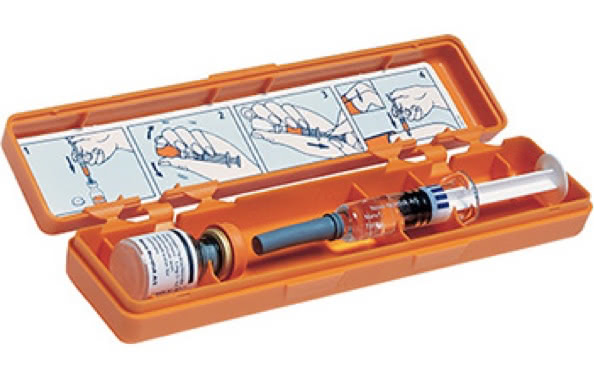For the treatment of severe hypoglycemia in pediatric and adult patients with diabetes and as a diagnostic aid for use during radiologic examinations to temporarily inhibit movement of the gastrointestinal tract in adult patients.

Storage information for GlucaGen® HypoKit® (glucagon) for injection 1mg/mL.
Before Reconstitution
The GlucaGen® package may be stored up to 24 months at controlled room temperature 20°-25° C (68°-77° F) prior to reconstitution. Do not freeze. Keep in the original package to protect from light. GlucaGen® should not be used after the expiration date on the vials.1
After Reconstitution
Reconstituted GlucaGen® should be used immediately. Discard any unused portion. If the solution shows any sign of gel formation or particles, it should be discarded.1

GlucaGen® is glucagon.
Indications and Usage for GlucaGen® (glucagon) for injection 1mg/mL
GlucaGen® (glucagon) for injection 1mg/mL is an antihypoglycemic agent and a gastrointestinal motility inhibitor indicated for the treatment of severe hypoglycemia in pediatric and adult patients with diabetes and as a diagnostic aid for use during radiologic examinations to temporarily inhibit movement of the gastrointestinal tract in adult patients.
Important Safety Information
Contraindications
GlucaGen® is contraindicated in patients with:
- Pheochromocytoma because of the risk of substantial increase in blood pressure
- Insulinoma because of the risk of hypoglycemia
- Known hypersensitivity to glucagon or the excipients in GlucaGen®. Allergic reactions have been reported with glucagon and include anaphylactic shock with breathing difficulties and hypotension
- Glucagonoma when used as a diagnostic aid because of risk of hypoglycemia
Warnings and Precautions
- Substantial Increase in Blood Pressure in Patients with Pheochromocytoma: GlucaGen® is contraindicated in patients with pheochromocytoma because GlucaGen® may stimulate the release of catecholamines from the tumor.
- Hypoglycemia in Patients with Insulinoma: In patients with insulinoma, administration of glucagon may produce an initial increase in blood glucose; however, GlucaGen® administration may directly or indirectly (through an initial rise in blood glucose) stimulate exaggerated insulin release from an insulinoma and cause hypoglycemia. GlucaGen® is contraindicated in patients with insulinoma. If a patient develops symptoms of hypoglycemia after a dose of GlucaGen®, give glucose orally or intravenously.
- Hypersensitivity and Allergic Reactions: Allergic reactions have been reported with glucagon, these include generalized rash, and in some cases anaphylactic shock with breathing difficulties and hypotension. GlucaGen® is contraindicated in patients with a prior hypersensitivity reaction.
- Lack of Efficacy in Patients with Decreased Hepatic Glycogen: GlucaGen® is effective in treating hypoglycemia only if sufficient hepatic glycogen is present. Patients in states of starvation, with adrenal insufficiency or chronic hypoglycemia may not have adequate levels of hepatic glycogen for GlucaGen® administration to be effective. Patients with these conditions should be treated with glucose.
- Necrolytic Migratory Erythema (NME), a skin rash commonly associated with glucagonomas (glucagon-producing tumors) and characterized by scaly, pruritic erythematous plaques, bullae, and erosions, has been reported post-marketing following continuous glucagon infusion and resolved with discontinuation of the glucagon. Should NME occur, consider whether the benefits of continuous glucagon infusion outweigh the risks.
- Hyperglycemia in Patients with Diabetes Mellitus when Used as a Diagnostic Aid: Treatment with GlucaGen® in patients with diabetes mellitus may cause hyperglycemia. Monitor diabetic patients for changes in blood glucose levels during treatment and treat if indicated.
- Blood Pressure and Heart Rate Increase in Patients with Cardiac Disease when used as a Diagnostic Aid: GlucaGen® may increase myocardial oxygen demand, blood pressure, and pulse rate which may be life-threatening in patients with cardiac disease. Cardiac monitoring is recommended in patients with cardiac disease during use of GlucaGen® as a diagnostic aid, and an increase in blood pressure and pulse rate may require therapy.
- Hypoglycemia in Patients with Glucagonoma: Glucagon administered to patients with glucagonoma may cause secondary hypoglycemia. Test patients suspected of having glucagonoma for blood levels of glucagon prior to use as a diagnostic aid as GlucaGen® is contraindicated in this setting.
Adverse Reactions
- Glucagon adverse reactions identified during post approval use are: injection site reactions, nausea, vomiting, headache, dizziness, asthenia, pallor, diarrhea, somnolence, and decreased blood pressure.
Drug Interactions
- Beta-blockers patients taking beta-blockers may have a transient increase in pulse and blood pressure.
- Indomethacin: In patients taking indomethacin, GlucaGen® may lose its ability to raise blood glucose or may produce hypoglycemia.
- Anticholinergic Drugs: Concomitant use of anticholinergic drugs with GlucaGen® for use as a diagnostic aid is not recommended.
- Warfarin: GlucaGen® may increase the anticoagulant effect of warfarin.
- Insulin: Monitor blood glucose when GlucaGen® is used as a diagnostic aid in patients receiving insulin.
Please click here for Glucagen® Prescribing Information.
Reference
- GlucaGen [package insert]. Plainsboro, NJ: Novo Nordisk Inc.